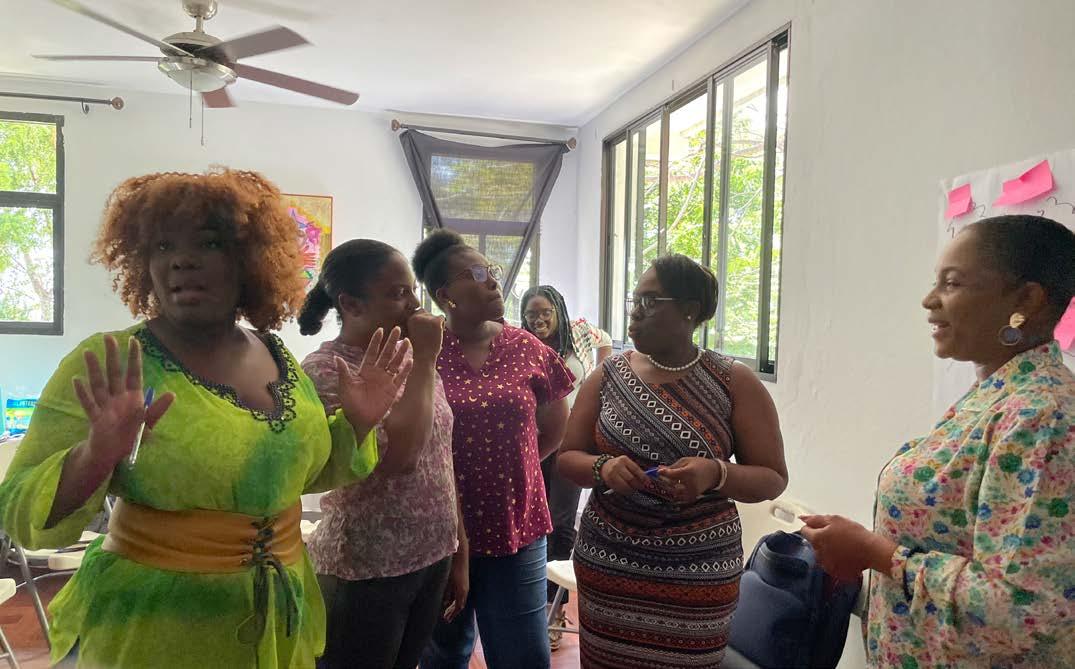
3 minute read
Collective Research in Bangladesh
In early December 2022, the CCDB team and three Coady staff travelled to Patharghata in Southern Bangladesh to hear from members of the women’s groups supported by ENGAGE for the collective research and to conduct monitoring evaluation and learning (MEL) focus groups. The collective research seeks to explore the women’s experiences with and understanding of feminism and equity, their perspectives on their rights, and their conceptions around leadership.
But being semi-structured leaves room for flexibility, for the interviewer to dig deeper, to pivot, or to reframe questions based on the respondent’s answers.
Once in Patharghata, we set out to the first women’s group site and were greeted with excitement outside of the home of Rubia, one of the group members who would be interviewed for the collective research. Sitting in a circle, surrounded by vertical gardens boasting eggplants, peppers, and tomatoes, and with a lush canopy of banana and palm trees overhead, a member CCDB and Coady began our introductions and expressed gratitude for being welcomed into this space to hear these women’s stories. The team then moved into the house to interview Rubia, while outside, excited conversation began around changes that have been seen or experienced since the start of ENGAGE.
In preparation for the data collection, Coady and CCDB staff worked together to refine the interview tool, which had been developed with other ENGAGE partners while gathered in Ethiopia in September 2022. To build the CCDB team’s confidence in conducting semi-structured interviews, Coady staff explained that with this approach to collecting qualitative data, what we are looking for is stories. We use the interview tool to guide the conversation, preparing prompts to get at certain themes we are interested in learning about – in this case, feminism, equity, rights, and leadership.
While there were a few members who were especially vocal, all the women participated and built on each other’s responses. Inside the house, Imran and Martha learned how Rubia had participated in several training sessions around livestock, climate agriculture, advocacy and lobbying, and leadership. Not only has she implemented the knowledge she gained to support her children’s education and her family’s expenses, but she also shares her knowledge with other women and neighbors, many of whom have begun cultivating and using the climate adaptive technologies and techniques.
Many of the morning group’s sentiments were echoed by a second group. There was consensus that the women’s confidence has grown considerably as a result of participation in the project. Several participants explained how they were shy and did not speak with many people before ENGAGE, even stating to Eric, “at this moment we dare to speak with you.” weren’t aware of or didn’t know how to action them. As one woman from the collective research interview expressed, “I already had the inner talent, but Engage helped me figure out how to realize it!”
Prior to their involvement with ENGAGE, the women were mostly confined to the home, but now, they occupy and participate confidently in spaces where they would not have previously dared to venture, such as government offices and markets. Similarly, the collective research interviewee explained how she has entered spaces as the first female member: both in her temple committee and as one of three lead farmers –the only woman – in her union. She expressed how being able to use her talents to benefit her community makes her “feel so happy and glad. [Prior to ENGAGE,] I had the education, but I was not involved, I was not going out to the community on my own. But now I do so much in the community, I’m well known.”
The collective research process is ongoing across the ENGAGE partners, but early themes from these interviews point to the value of the capacity building and asset-based approach of the project. Importantly, several women acknowledged that they had these innate strengths and talents, but prior to ENGAGE, they
When it came to discussions of leadership, both the collective research interviews and the focus group respondents stressed that leaders don’t work alone – they work with and alongside others in their communities. They highlighted the power and strength in groups and in knowledge sharing, even beyond those involved with ENGAGE. As one respondent stated, “You cannot do everything all alone, so what I know, I have to share with others.”








